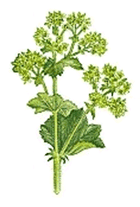
Blessed Thistle
Introduction
This fact sheet provides basic information about blessed thistle. Blessed Thistle, the sole species in the genus Cnicus, is a thistle-like plant in the family Asteraceae, native to the Mediterranean region, from Portugal north to southern France and east to Iran. Note: Blessed Thistle should not be mistaken for milk thistle ( Silybum marianus ) or other members of the thistle family.Common Names
Blessed Thistle, Cnicus benedictus, Holy Thistle, Holy Ghost herb, Bitter Thistle, Carbenia Benedicta, Cardo Santo, Spotted Thistle, St. Benedict's Thistle, Chardon BenitLatin Names
Cnicus benedictusWhat It Is Used For
- It is used to treat upset stomach with gas, lack of appetite (not feeling hungry), and on the skin for treating infected wounds or ulcers.
How It Is Used
Blessed thistle leaves, stems, and flowers have traditionally been used in "bitter" tonic drinks and in other preparations taken by mouth to enhance appetite and digestion.What the Science Says
- Bacterial infections Laboratory studies report that blessed thistle (and chemicals in blessed thistle such as cnicin and polyacetylene) has activity against several types of bacteria and no effects on some types. Reliable human study is lacking. Further evidence is necessary in this area before a firm conclusion can be drawn.
- Indigestion and flatulence (gas) Blessed thistle is traditionally believed to stimulate stomach acid secretion, and has been used as a treatment for indigestion or gas. However, there is limited scientific study in these areas. Additional research is needed before a firm conclusion can be reached.
- Viral infections Laboratory studies report no activity of blessed thistle against herpes viruses, influenza, or poliovirus. Effects of blessed thistle (or chemicals in blessed thistle called lignans) against HIV are not clear. Human research of blessed thistle as a treatment for viral infections is lacking.
- This herb has been tested in laboratory studies for its properties against infections, cancer, and inflammation with promising results. However, high-quality trials showing benefits in humans are lacking.
Side Effects and Cautions
- Blessed thistle is usually considered safe when used at recommended doses for short durations. Some people experience stomach discomfort, such as vomiting.
- Other potential side effects include skin rash or eye irritation. Adverse effects may be the consequence of blessed thistle allergies.
Sources
- Bradley PR (ed). British Herbal Compendium, vol 1. Bournemouth, Dorset, UK: British Herbal Medicine Association, 1992, 126-127.
- Foster S. 101 Medicinal Herbs. Loveland, CO: Interweave Press, 1998, 32-33.
- Lust JB. The Herb Book. New York: Bantam Books, 1974, 343.
- National Center for Complementary and Alternative Medicine (NCCAM): A division of the U.S. Department of Health & Human Services dedicated to research.
- Natural Standard: An organization that produces scientifically based reviews of complementary and alternative medicine (CAM) topics.
- Right Health Web site. Accessed on February 6, 2009.
- From Wikipedia, the free encyclopedia. Accessed on February 6, 2009.






